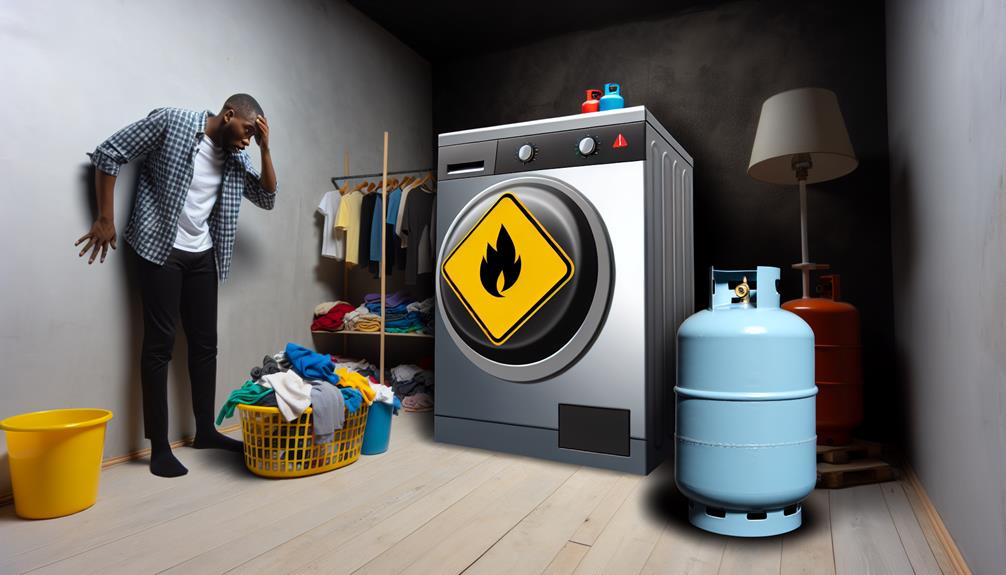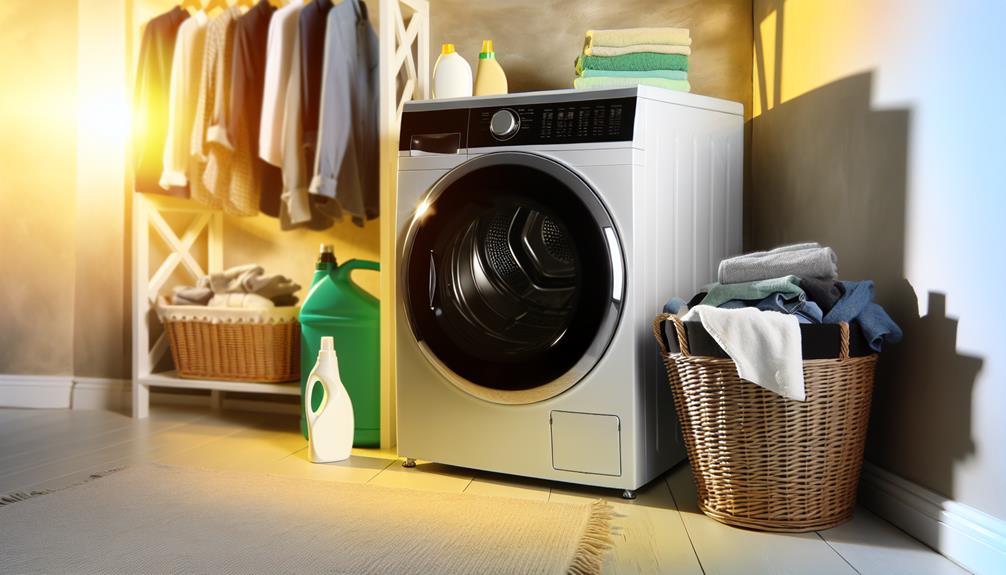A propane dryer can be a suitable option for your laundry needs, particularly if energy efficiency and quick drying times are priorities. These dryers utilize propane gas to deliver faster drying cycles, thereby lowering operational costs. They also produce less carbon emissions compared to electric models, supporting environmentally conscious practices. However, potential buyers must consider the initial installation costs, maintenance requirements, and flammability risks associated with propane use. Additionally, evaluating the availability of propane connections in your area is essential. Exploring these key factors will further inform your decision-making process.
Key Takeaways
- Propane dryers offer faster drying times and higher energy efficiency, leading to lower utility bills over time.
- They emit fewer greenhouse gases compared to traditional fossil fuels, contributing to a more sustainable laundry practice.
- The availability of propane and local regulations should be assessed to ensure compatibility with your home.
- Maintenance requirements may be more complex and costly, necessitating regular inspections and safety measures.
- Consider the initial installation costs versus long-term savings when evaluating the overall cost-effectiveness of propane dryers.
Understanding Propane Dryers

Understanding the intricacies of propane dryers is vital for enhancing laundry efficiency and energy usage. Propane dryers operate on a distinct principle compared to electric models, utilizing propane gas as a fuel source, which generally leads to improved propane efficiency. This efficiency is characterized by faster drying times and lower operational costs, making it a favorable choice for households aiming to reduce energy expenditures. Additionally, exploring various fitness sales job opportunities can provide insights into how energy-efficient appliances align with sustainable living practices.
To maximize the benefits of a propane dryer, proper dryer maintenance is essential. Regular inspection of gas lines, venting systems, and burner components guarantees safe and efficient operation. Additionally, cleaning lint traps and exhaust ducts not only improves efficiency but also mitigates fire hazards.
Understanding the appropriate settings for various fabric types can further improve performance while conserving propane. Users should familiarize themselves with temperature controls and drying cycles specific to their dryer model. By investing time in maintenance and understanding the operational parameters of propane dryers, users can achieve a blend of efficiency and safety, fostering a sense of belonging within a community that values sustainable living and effective laundry practices.
Advantages of Propane Dryers
The efficiency and cost-effectiveness of propane dryers make them an increasingly popular choice for households seeking to enhance their laundry processes. In addition, just like finding the best fitness programs at Crunch Fitness, selecting a propane dryer can lead to significant improvements in your daily routines. Propane dryers heat up more quickly than electric models, resulting in reduced drying times and lower energy consumption. This translates to savings on utility bills, making propane an economical alternative for families.
Another advantage lies in the consistent performance of propane dryers. They provide higher heat levels, which can effectively eliminate moisture from clothes, ensuring they dry thoroughly and are less prone to mildew growth. Furthermore, propane dryers typically require less maintenance compared to electric models, as they have fewer complex electrical components.
Propane safety is paramount; modern propane dryers are equipped with advanced safety features, including automatic shut-off mechanisms that prevent overheating. Regular dryer maintenance, such as cleaning lint filters and inspecting venting systems, can further enhance safety and efficiency. By adhering to these maintenance practices, homeowners can extend the lifespan of their appliances while ensuring ideal performance.
Disadvantages of Propane Dryers

While propane dryers offer numerous benefits, several disadvantages warrant careful consideration. One significant concern lies in the safety aspects associated with propane as a fuel source. Propane is flammable, which necessitates stringent safety measures to prevent leaks or accidents. Homeowners must guarantee that their propane connections are properly installed and maintained, as even minor issues can lead to hazardous situations. Additionally, understanding how to protect assets during financial recovery can be vital if unexpected expenses arise from maintenance or safety issues.
Additionally, propane dryers come with specific maintenance requirements that can be more demanding than their electric counterparts. Regular inspections of the gas lines, burners, and exhaust systems are essential to guarantee peak performance and safety. This maintenance often requires the expertise of a qualified technician, which can impose both time and financial burdens on the homeowner.
Moreover, the need for proper ventilation adds another layer of complexity to installation. Unlike electric dryers, which can often be placed in various locations, propane dryers require adequate airflow to safely expel combustion gases. This limitation may restrict placement options, potentially complicating laundry room design and functionality.
Cost Comparison With Electric Dryers
Evaluating the cost comparison between propane dryers and electric dryers reveals significant differences that can influence a homeowner's decision. Initial installation costs for propane dryers are generally higher due to the need for specialized venting and potential modifications to existing gas lines. Homeowners may incur additional expenses if they lack access to propane infrastructure. Additionally, those interested in maximizing their energy efficiency might consider kickstarting their career in business analytics to better analyze their home energy costs.
In terms of operational costs, propane prices can fluctuate but often provide a more cost-effective drying solution over time. Propane typically offers a higher energy output compared to electricity, which can result in lower utility bills, especially in areas where electricity rates are substantially higher. This advantage can make propane dryers appealing for households that frequently use their dryer.
Conversely, electric dryers usually present a lower upfront investment with simpler installation processes, making them more accessible for many homeowners. However, ongoing electricity costs can accumulate, potentially offsetting the initial savings.
Ultimately, the choice between propane and electric dryers should be guided by an extensive analysis of both installation costs and long-term operational expenses, allowing homeowners to make an informed decision that aligns with their financial goals and lifestyle preferences.
Environmental Impact of Propane

The environmental impact of propane as a fuel source for dryers is marked by lower carbon emissions compared to traditional fossil fuels, contributing to a reduced overall greenhouse gas footprint. In the context of key trends and challenges for 2024, the shift towards cleaner energy sources is increasingly important. Additionally, the development of renewable propane options further enhances its sustainability profile, offering a viable alternative that aligns with environmental goals. Furthermore, propane dryers typically exhibit energy efficiency benefits, which can lead to decreased energy consumption and operational costs over time.
Lower Carbon Emissions
Reducing carbon emissions is a critical factor in today's environmentally conscious society, and propane stands out as a cleaner energy source for laundry applications. Unlike traditional electric dryers that often rely on fossil fuels for electricity generation, propane dryers produce considerably lower propane emissions. This makes them an appealing option for consumers seeking laundry sustainability without sacrificing performance.
When evaluating the environmental impact of laundry practices, it is essential to examine the entire lifecycle of energy sources. Propane emits approximately 43% less carbon dioxide than coal and 12% less than oil when combusted. As a result, utilizing propane for drying clothes can contribute to a reduced carbon footprint in your household.
Moreover, propane's efficiency in generating heat allows dryers to operate more effectively, shortening drying times and further enhancing energy savings. This not only benefits the environment but also lowers utility bills, making propane a financially attractive option for eco-conscious consumers. By choosing propane, you align your laundry practices with a commitment to lower carbon emissions, fostering a sense of belonging within a community that values sustainable living.
Renewable Propane Options
Renewable propane options are emerging as a promising advancement in the pursuit of sustainable energy solutions. As the demand for cleaner energy sources intensifies, innovative propane sources derived from renewable materials are being developed. These renewable propane fuels are produced from organic waste, thereby contributing to a circular economy while considerably reducing greenhouse gas emissions.
The environmental benefits of renewable propane include:
- Reduced Carbon Footprint: Utilizing renewable sources minimizes reliance on fossil fuels.
- Waste Utilization: Organic waste materials are transformed into usable energy, promoting waste reduction.
- Compatibility: Renewable propane can be used in existing propane appliances without modification.
- Energy Security: Diversifying energy sources enhances stability in energy supply.
Energy Efficiency Benefits
Propane dryers offer significant energy efficiency benefits that contribute to a reduced environmental impact. With a focus on propane efficiency, these appliances are designed to utilize propane as a clean-burning fuel source, which results in lower greenhouse gas emissions when compared to electric dryers. The combustion of propane generates less carbon dioxide and particulate matter, making it a favorable option for environmentally conscious consumers.
In addition to their cleaner emissions, propane dryers are known for their superior drying speed. They can achieve higher temperatures more quickly than traditional electric models, allowing laundry to dry faster and reducing overall energy consumption. This efficiency translates to shorter drying cycles, which not only saves time but also decreases the energy required per load.
Moreover, propane dryers can operate efficiently even in colder climates, where electric models may struggle to maintain performance. This adaptability guarantees that users can enjoy consistent energy savings year-round. By choosing a propane dryer, consumers can align their laundry practices with their environmental values, embracing a more sustainable lifestyle while enjoying the benefits of enhanced performance and efficiency.
Factors to Consider Before Buying
When contemplating the purchase of a propane dryer, it is essential to evaluate several key factors that can markedly impact performance and efficiency. Understanding the specific needs of your household will guide you in making a well-informed decision.
Key factors to take into account include:
- Installation Requirements: Assess the availability of propane connections and guarantee compliance with local regulations.
- Size and Capacity: Choose a dryer that accommodates your laundry volume, including larger items like blankets or comforters.
- Maintenance Considerations: Evaluate the frequency and type of maintenance required to keep the dryer operating efficiently, such as cleaning lint traps and inspecting gas lines.
- Safety Features: Look for models equipped with safety mechanisms, such as automatic shut-off and flame sensors, to enhance user safety.
Frequently Asked Questions
Can Propane Dryers Be Used in Apartments or Small Spaces?
Propane dryers can indeed be utilized in apartments or small spaces, provided that proper propane installation adheres to local codes and regulations. Their compact design often enhances space efficiency, making them suitable for limited laundry areas. However, it is essential to guarantee adequate ventilation and safety measures are in place during installation. By prioritizing these considerations, residents can enjoy the benefits of a propane dryer while optimizing their living environment effectively.
How Do Propane Dryers Compare in Drying Time to Electric Dryers?
When comparing propane dryers to electric dryers, drying efficiency and energy consumption are critical factors. Propane dryers generally heat up faster, leading to reduced drying times due to their higher BTU output, which translates into quicker moisture removal. This increased efficiency can result in lower operational costs over time, despite potentially higher initial investments. Ultimately, consumers should consider both drying performance and energy use when selecting the best option for their laundry needs.
What Maintenance Is Required for Propane Dryers?
Maintaining a propane dryer involves several critical aspects, including regular inspection of ventilation requirements to guarantee proper exhaust flow and efficiency. It is essential to check for any blockages or leaks in the venting system. Additionally, fuel source considerations must be addressed; verify that the propane supply is adequate and that connections are secure. Routine cleaning of lint traps and periodic professional servicing will enhance performance and safety, guaranteeing peak operation and longevity.
Are Propane Dryers Safe for Indoor Use?
Propane dryers can be safely used indoors; however, specific precautions must be observed. Proper indoor ventilation is essential to mitigate any risks associated with propane safety, including the potential accumulation of carbon monoxide. Ensuring that the dryer is installed according to manufacturer guidelines and local codes is vital. Regular maintenance and checks on ventilation systems further enhance safety, making it possible to enjoy the efficiency of propane drying while maintaining a secure indoor environment.
Can I Convert My Electric Dryer to Propane?
Converting an electric dryer to propane is generally not feasible due to significant differences in design and functionality. The conversion process involves modifying the appliance's heating system, which is complex and often requires specialized components. Additionally, cost considerations can be substantial, including parts and labor, potentially outweighing the benefits. It is advisable to consult a professional technician to explore alternative options, such as purchasing a dedicated propane dryer that meets your laundry needs efficiently.

